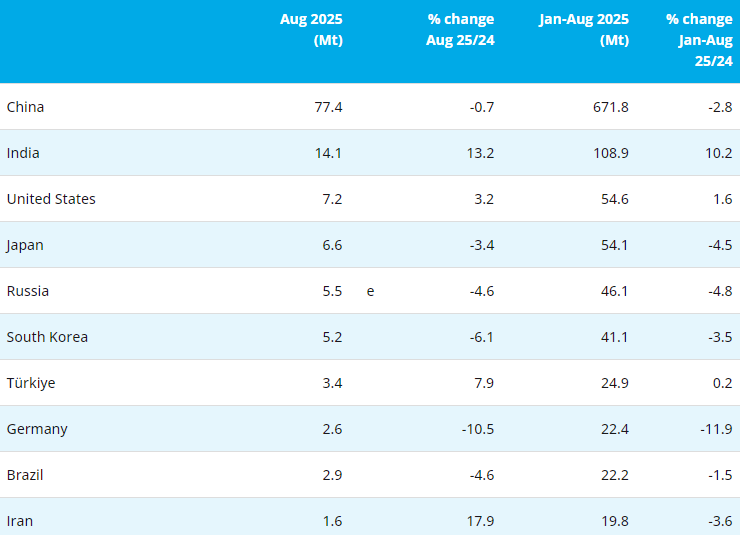[ferro-alloys.com]The implementation of the Section 232 steel and aluminum tariffs under President Donald Trump could be revised or phased out under a new administration if Democratic contender Joe Biden wins the US presidential election in November, but any changes to the trade program would not be immediate, according to trade experts.
Biden may find himself in a "trickier spot" as his administration will likely not be able to simply remove the tariffs that Trump imposed in 2018, according to Will Planert, a partner at Morris, Manning & Martin's international trade practice.
"It would be very hard for the Democratic constituency to tell the steel industry and the unions that they're just lifting these duties now and opening our shores to more imports," Planert said in an interview with S&P Global Platts.
Planert said he expects a Biden administration to instead strategically replace the steel and aluminum tariffs.
"What you will see is ways for them to try and rationalize these duties," he said. "You will see ways for them to negotiate broader deals to phase them out and eliminate them."
If a Biden victory is accompanied by Democratic majorities in Congress, Planert said there may also be legislative efforts aimed at modifying Section 232 by requiring time limits on tariffs or Congressional approval in some capacity.
Planert said such actions related to the Section 232 tariffs would "rein the process in a little bit and make it tougher for a president to just impose them at his own whim."
Mark Herlach, an attorney and partner with Eversheds Sutherland, said a new incoming administration would need to consider the impact of removing the tariffs while also reevaluating how Section 232 was originally designed to be implemented.
"On the one hand, there will be an effort to continue to support US workers." Herlach told Platts. "At the same time, the tariffs have proven to be a source of friction with some of our key trading partners. That would suggest that we might want to get rid of them and take a more cooperative approach."
Herlach said Biden would likely consider feedback from various industry groups before ultimately modifying or removing the tariffs.
"If I had to anticipate, I think there's a good chance that they probably would be removed, but there could be advocacy from the steel and aluminum industries to not do that," Herlach said. "But there will also be advocacy from the people who are their customers to go in that direction, and I think there would be serious consideration to assist the steel and aluminum industries in some other ways than tariffs."
Tariffs likely to stay unchanged under Trump
If reelected, Herlach said there is no reason to expect Trump to take a different approach with regards to Section 232, with one aim still being to influence trading partners.
"I think that's why you've seen the administration use them, because they appeal to the president's desire to have unfettered discretion," Herlach said. "In the case of steel and aluminum, you've seen the administration on its own initiate cases which some would suggest were largely designed to pressure our trading partners."
The Trump administration's unilateral approach to trade has been characterized by a transactional view of the world where the tariffs are used as a response to the actions of other countries, Herlach added.
"You will see responses to specific situations just like we recently saw reversals with respect to Canada on the aluminum tariffs because of the fact that the Canadians had threatened retaliation," he said. "So we backed down from reimposing the tariffs."
Planert provided a similar view, suggesting that the tariff program would not change much following a Trump victory.
"He will impose these duties here and there," Planert said. "They seem to like to cut individual deals with countries, and so you may see more countries trying to do that to get out from under them with some kind of quota deal."
Planert said Trump's administration has interpreted Section 232 as giving it unrestricted power to impose duties without clear reasoning.
"There is no sort of overarching strategy here that I can see about what we are trying to accomplish with these," he said. "The president views these things as a hammer that he can use when he sees fit."
Referencing the Trump administration's move to double the steel and aluminum tariffs on Turkey in 2018, Planert said Section 232 has sometimes been implemented in instances that were unrelated to economic impact from imports, and thus not used for its intended purpose.
"It was used as a way of trying to punish Turkey when we were upset with something else that they had done."
(S&P Global Platts)
- [Editor:王可]



 Save
Save Print
Print Daily News
Daily News Research
Research Magazine
Magazine Company Database
Company Database Customized Database
Customized Database Conferences
Conferences Advertisement
Advertisement Trade
Trade













Tell Us What You Think